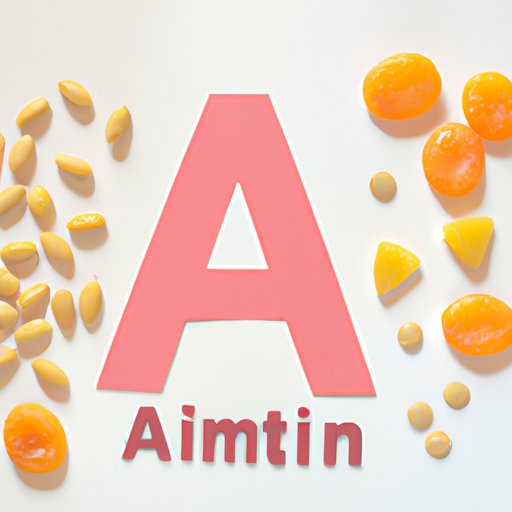Introduction
Vitamin A is an essential nutrient that plays a vital role in maintaining good health. This fat-soluble vitamin is involved in several bodily processes, including vision, immune function, skin health, and more. Lack of Vitamin A can lead to vision problems, weakened immunity, and other health issues. On the other hand, getting enough of this nutrient is associated with numerous benefits and can help keep your body functioning at its best. In this article, we’ll explore the top foods rich in Vitamin A, the benefits of Vitamin A supplementation, and how Vitamin A can support eye health, skin health, and immunity.
The Top 10 Foods Rich in Vitamin A
One of the best ways to ensure adequate Vitamin A intake is to incorporate more foods rich in this nutrient into your diet. Here are ten foods that are naturally high in Vitamin A:
- Sweet potatoes
- Carrots
- Spinach
- Kale
- Cantaloupe
- Mango
- Papaya
- Egg yolks
- Salmon
- Liver
Each of these foods has its own unique set of benefits, in addition to their Vitamin A content. For example, sweet potatoes are a great source of fiber, potassium, and vitamins C and B6. Carrots contain beta-carotene, a precursor to Vitamin A that is important for eye health. Spinach and kale are packed with antioxidants and other important nutrients, while cantaloupe and papaya are both high in Vitamin C. Egg yolks and salmon are excellent sources of protein, while liver is one of the most nutrient-dense foods you can eat.
So how can you incorporate more of these foods into your diet? One simple way is to add them to salads, soups, or smoothies. You can also roast or bake sweet potatoes or carrots for a tasty and nutritious side dish. And if you’re feeling adventurous, liver pâté or salmon cakes can be a delicious way to get more of this essential nutrient into your diet.
The Benefits of Vitamin A Supplementation
While getting enough Vitamin A from food is the best way to maintain healthy levels of this nutrient, some people may need to take supplements to meet their daily needs. For example, pregnant women may require more Vitamin A than they can get from their diet alone, while those with certain medical conditions may also benefit from supplementation.
It’s important to note that too much Vitamin A can be harmful, so it’s essential to follow recommended daily allowances. Currently, the recommended daily allowance for Vitamin A is 900 micrograms for men and 700 micrograms for women. It’s also essential to choose a high-quality supplement that is well-absorbed by the body.
That being said, there are several benefits associated with Vitamin A supplementation. For example, this nutrient has been shown to improve vision, reduce inflammation, and support skin health by reducing the appearance of fine lines and wrinkles. It can also enhance immunity and help protect against infections.
The Role of Vitamin A in Eye Health
Vitamin A is perhaps most well-known for its role in maintaining healthy vision. This nutrient is a crucial component of rhodopsin, a protein responsible for phototransduction in the retina. Without adequate Vitamin A intake, you may be at risk of eye diseases like night blindness, which can make it difficult to see in low light conditions.
One of the easiest ways to incorporate more Vitamin A into your diet for better eye health is to eat beta-carotene-rich foods like sweet potatoes and carrots. These foods are converted to Vitamin A in the body and can help improve visual acuity and prevent eye diseases like macular degeneration.
Vitamin A and Skin Health
Vitamin A is also essential for maintaining healthy skin. This nutrient supports skin cell turnover, which is the process by which old skin cells are shed and replaced with new ones. This helps keep your skin looking fresh and youthful over time.
In addition, Vitamin A has anti-inflammatory effects that can reduce redness, acne, and other skin conditions. If you’re looking to improve your skin health, eating more Vitamin A-rich foods like liver and salmon can be a great place to start. You can also try topical treatments containing Vitamin A, like retinoids, which are often used to treat acne and reduce the appearance of fine lines and wrinkles.
Vitamin A and Immunity
Vitamin A is essential for a healthy immune system. This nutrient supports the production and function of white blood cells, which play a crucial role in fighting infections and diseases. Vitamin A also has antioxidant properties that can help protect against oxidative stress and reduce the risk of chronic disease.
If you’re looking to support your immune system with Vitamin A, incorporating more of this nutrient into your diet is a great place to start. Try eating more beta-carotene-rich foods like sweet potatoes and leafy greens, or consider taking a high-quality Vitamin A supplement.
Conclusion
Vitamin A is an essential nutrient that plays a vital role in maintaining good health. Whether you’re looking to support your vision, improve your skin health, or boost your immunity, incorporating more of this essential nutrient into your diet is a great place to start. By choosing foods like sweet potatoes, spinach, and liver, or considering a high-quality Vitamin A supplement, you can ensure that you’re getting all the benefits of this crucial nutrient.
